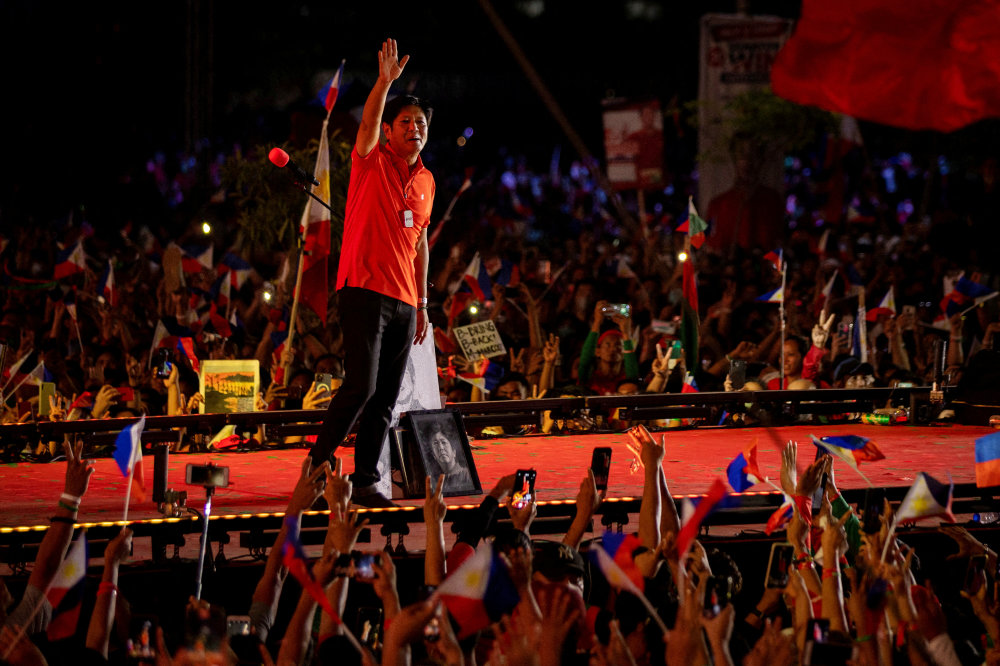MANILA: Ferdinand “Bongbong” Marcos Jr. remains the front-runner ahead of next week’s presidential vote in the Philippines, leading big in opinion polls, but analysts said on Tuesday voter sentiment could still diametrically change.
The Philippines will hold a general election on May 9, which will decide more than 18,000 positions across the archipelago including who will take over from Rodrigo Duterte and become its president for the next six years.
Around 67.5 million of the 110 million population are eligible to vote.
The main contenders are Marcos, 64, the son and namesake of the late Philippine dictator, and Vice President Leni Robredo, 57, the leader of the opposition and the only female candidate.
The latest survey released by Pulse Asia on Monday showed that Marcos had been favored by 56 percent of respondents — the same as in March. Robredo scored 23 percent, dropping one percentage point from last month’s poll.
“The numbers could change, might change, and might create a surprise,” Victor Andres Manhit, president of Stratbase ADR Institute, a research consultancy firm in Manila, told Arab News.
He noted that at least two out of every 10 Filipino voters changed their minds on election day. “Even Pulse says that there is 21 percent of possible or big possibility of changing, but we don’t know where they shift,” he said.
The pollster surveyed 2,400 adults nationwide between April 16 and 21. Manhit pointed out that the survey’s results represented the preferences of Filipinos but only at that particular moment.
“Surveys are simply a snapshot at that moment, which was supposed to be Easter when you look at the dates of Pulse,” he added.
“Survey firms do not tell us that this is the outcome. It’s not even predictive. It’s telling us about the preferences at that moment, and the most important moment is May 9.”
Davao City Mayor Sara Duterte-Carpio, Marcos’ running mate and the president’s daughter, also kept her lead in the vice-presidential race, favored by 55 percent of respondents. Robredo’s running mate, Sen. Francis Pangilinan, scored 16 percent.
The support for vice-presidential candidates does not necessarily reflect the voter’s preferences for the president. Unlike other presidential systems, where candidates are fielded on a joint ticket, the Philippines allows for split-ticket voting, which means that the president and vice president are elected separately.
Since Robredo has been drawing crowds of tens of thousands of people during rallies in recent days, Ramon Casiple, executive director of the Institute for Political and Electoral Reform, told Arab News her popularity was likely to increase.
“There is a trend of Robredo going up and Bongbong Marcos going down. Then suddenly, in this particular survey, Leni lost points … Marcos was not any significantly lessened,” he said.
“I was expecting the opposite because in some major provinces, for example Davao Del Norte, there was a change of the local support by the politicians there from Marcos to Robredo.”
Casiple added that Marcos’ rejection of a challenge to debate Robredo one-on-one last week, was a development that could affect his popularity.
Marcos is avoiding a repeat of a loss to Robredo in 2016, when both competed for the vice presidency, and he was hounded over questions related to his father’s violent rule.
Marcos’ father was overthrown in 1986 after ruling the Philippines for more than two decades, which have been described as one of the darkest chapters in Philippine history.
Marcos Jr. spent decades of his political career trying to rehabilitate the family’s name. In his presidential campaign, he has been advocating national unity and promising to lift the country from the economic impacts of the coronavirus pandemic.
Robredo is a former human rights lawyer. She served as Duterte’s housing minister but resigned and has become one of his staunchest critics.
She is pushing for public-sector transparency and has pledged to strengthen the country’s medical system.
If she wins, Robredo would be the third woman to lead the Philippines after democracy champion Corazon Aquino in 1986 and Gloria Macapagal-Arroyo in 2001.




